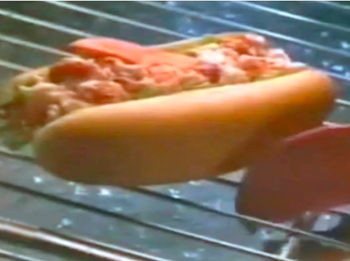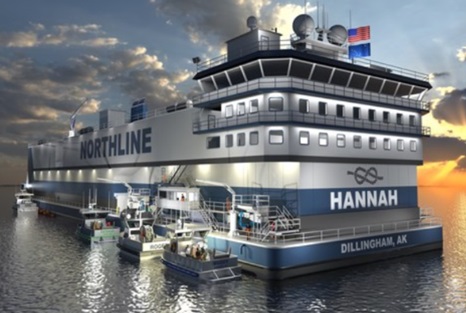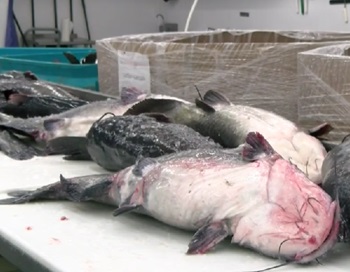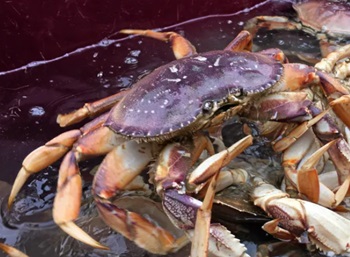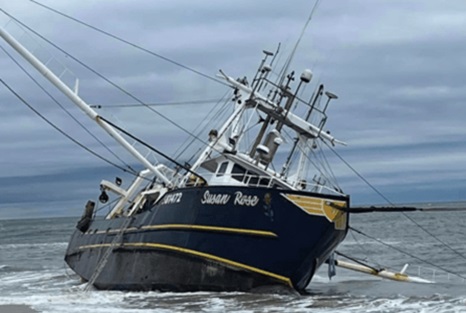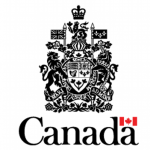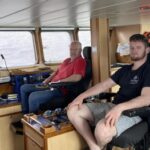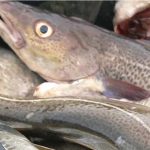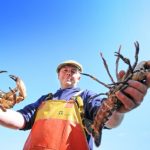Author Archives: borehead - Moderator
Bristol Bay Fishermen Celebrate Supreme Court Decision to Reject Alaska v. EPA
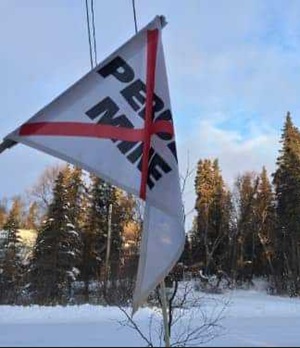 Monday, the United States Supreme Court announced their decision to reject the State of Alaska’s challenge of the Environmental Protection Agency’s (EPA) Clean Water Act veto of the proposed Pebble Mine. Commercial fishermen joined Bristol Bay Tribes and a majority of Alaskans in asking EPA to act to veto Pebble Mine over a decade ago. This protective action, finalized in January of 2023, ensured that Bristol Bay’s irreplaceable salmon runs – which sustain the people, culture as well as the foundation of a commercial fishing industry that generates more than $2 billion annually in economic output and supports more than 15,000 jobs – are not impacted by irresponsible open pit mining. more, >>click to read<< 14:05
Monday, the United States Supreme Court announced their decision to reject the State of Alaska’s challenge of the Environmental Protection Agency’s (EPA) Clean Water Act veto of the proposed Pebble Mine. Commercial fishermen joined Bristol Bay Tribes and a majority of Alaskans in asking EPA to act to veto Pebble Mine over a decade ago. This protective action, finalized in January of 2023, ensured that Bristol Bay’s irreplaceable salmon runs – which sustain the people, culture as well as the foundation of a commercial fishing industry that generates more than $2 billion annually in economic output and supports more than 15,000 jobs – are not impacted by irresponsible open pit mining. more, >>click to read<< 14:05
Catch of the Night
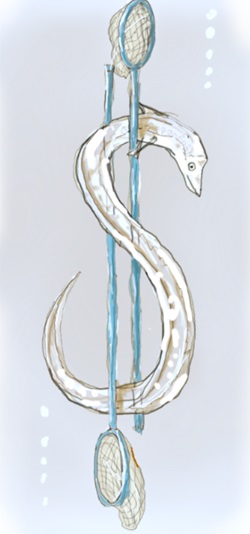 The American eel’s lifestyle is as elusive as it gets. No one has seen one mate in the Sargasso Sea, the eel’s birthplace. However, we know that after hatching, eels begin their journey to land by following the Antilles Current and Gulf Stream toward the mouths of North American rivers. Elvers (juvenile specimens also known as glass eels) then venture inland, mature, and later return to the ocean to mate, with the entire process ranging from a few months to a few years in duration. The unfortunate truth is that eel populations worldwide are rapidly declining. They have faced overfishing since the 1970s, resulting in poaching regulations in most of the world. Today, just two US states award eel fishing licenses: South Carolina and Maine. Because South Carolina only allows traps for fully grown eels, Maine has become the heart of the elver issue. more, >>click to read<< By Phil Avilov10:31
The American eel’s lifestyle is as elusive as it gets. No one has seen one mate in the Sargasso Sea, the eel’s birthplace. However, we know that after hatching, eels begin their journey to land by following the Antilles Current and Gulf Stream toward the mouths of North American rivers. Elvers (juvenile specimens also known as glass eels) then venture inland, mature, and later return to the ocean to mate, with the entire process ranging from a few months to a few years in duration. The unfortunate truth is that eel populations worldwide are rapidly declining. They have faced overfishing since the 1970s, resulting in poaching regulations in most of the world. Today, just two US states award eel fishing licenses: South Carolina and Maine. Because South Carolina only allows traps for fully grown eels, Maine has become the heart of the elver issue. more, >>click to read<< By Phil Avilov10:31
BOEM Aims to Control Offshore Wind Developments’ Risk to Right Whales
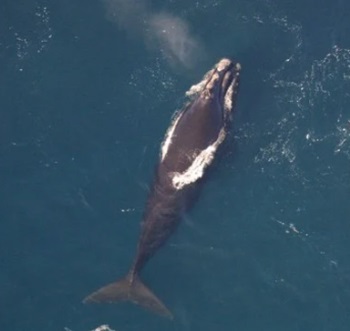 In advance of future offshore wind development in the New York Bight, the Bureau of Ocean Energy Management is preparing a region-wide environmental impact statement, paving the way for faster federal permitting of each individual project down the road. If built out, the future projects would mean the installation of about 1,100 turbines, 22 offshore substations and 1,600 miles of subsea cable. Without mitigation, BOEM expects the development of six offshore wind farms would have a “major” impact on right whales because of the noise from pile driving, blasting of unexploded ordnance, entanglement in abandoned gear and vessel strikes. North Atlantic right whales are so endangered that each individual death has a substantial impact, and additional losses cannot be absorbed – so BOEM wants to control the risk. more, >>click to read<< 09:15
In advance of future offshore wind development in the New York Bight, the Bureau of Ocean Energy Management is preparing a region-wide environmental impact statement, paving the way for faster federal permitting of each individual project down the road. If built out, the future projects would mean the installation of about 1,100 turbines, 22 offshore substations and 1,600 miles of subsea cable. Without mitigation, BOEM expects the development of six offshore wind farms would have a “major” impact on right whales because of the noise from pile driving, blasting of unexploded ordnance, entanglement in abandoned gear and vessel strikes. North Atlantic right whales are so endangered that each individual death has a substantial impact, and additional losses cannot be absorbed – so BOEM wants to control the risk. more, >>click to read<< 09:15
Fishermen rescued off Cork coast in freezing temperatures and high winds
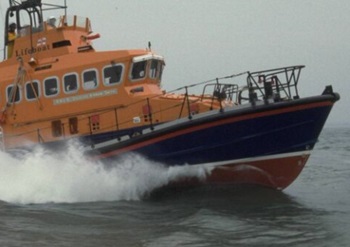 Three men have been rescued off the East Cork coast after their boat was in danger of washing up against rocks. The 11m boat they were on had been disabled 2.5 miles off Power Head at around 2am on Tuesday. Temperatures were freezing and a bitter north-easterly wind — force 5-6 — created a two-metre swell. Ballycotton RNLI received the request to launch at 2.15am and was told there was a risk of the vessel being washed up against the rocks. The crew boarded The Austin Lidbury all-weather lifeboat and headed west towards Power Head. more, >>click to read<< 07:46
Three men have been rescued off the East Cork coast after their boat was in danger of washing up against rocks. The 11m boat they were on had been disabled 2.5 miles off Power Head at around 2am on Tuesday. Temperatures were freezing and a bitter north-easterly wind — force 5-6 — created a two-metre swell. Ballycotton RNLI received the request to launch at 2.15am and was told there was a risk of the vessel being washed up against the rocks. The crew boarded The Austin Lidbury all-weather lifeboat and headed west towards Power Head. more, >>click to read<< 07:46
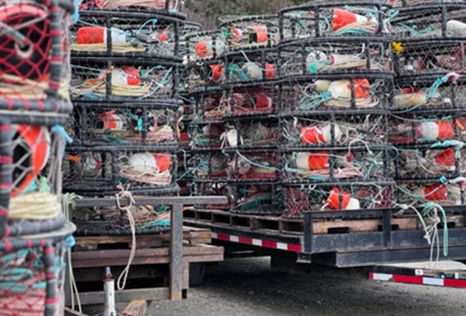
Crab Fishermen on Strike
Commercial Dungeness crab season is allowed locally as of midnight on January 5th. However, we are seeing no crab gear in the water. Local Dungeness crab fishermen are holding out for better pay after they say they’ve been offered an unacceptable amount per pound. The buyers are not offering a price that we’re okay with,” says Jake McMaster, Captain of the Fishing Vessel Captain Banjo. “They offered $3. We countered with $3.50 on the 1st of January, and we have not had a response to that price negotiation.” McMasters says they were getting this price over a decade ago, “$3 a pound– 2012, 2013, ten years ago. Meanwhile, Dungeness crab fishermen in Oregon are getting more than $3 a pound for their crabs. more, >>click to read<< 06:46
NOAA Fisheries Extends Emergency Measures for Gulf of Maine Haddock Quota through Remainder of Fishing Year 2023
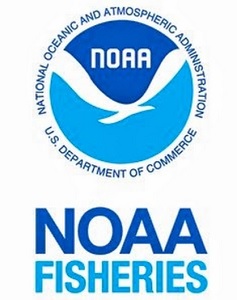 Effective January 9, 2024 – At the New England Fishery Management Council’s request, NOAA Fisheries took emergency action to increase the Gulf of Maine (GOM) haddock acceptable biological catch (ABC) for the 2023 fishing year. NOAA Fisheries increased the fishing year 2023 ABC to the fishing mortality associated with the maximum sustainable yield (FMSY) (2,515 mt). The emergency measures were included in the final rule for Framework Adjustment 65 (88 FR 56527; August 18, 2023). The emergency measures will expire on February 14, 2024, under the Magnuson-Stevens Act’s initial 180-day limit on the duration of an emergency action. more, links, >>click to read<< 19:40
Effective January 9, 2024 – At the New England Fishery Management Council’s request, NOAA Fisheries took emergency action to increase the Gulf of Maine (GOM) haddock acceptable biological catch (ABC) for the 2023 fishing year. NOAA Fisheries increased the fishing year 2023 ABC to the fishing mortality associated with the maximum sustainable yield (FMSY) (2,515 mt). The emergency measures were included in the final rule for Framework Adjustment 65 (88 FR 56527; August 18, 2023). The emergency measures will expire on February 14, 2024, under the Magnuson-Stevens Act’s initial 180-day limit on the duration of an emergency action. more, links, >>click to read<< 19:40
Fisheries Association still contends tough new rules for mullet fishery are unnecessary
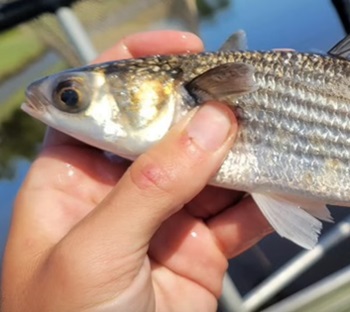 With three N.C. Marine Fisheries advisory committees set this week to make recommendations for changes in the striped mullet management plan, a trade and lobbying group for commercial fishermen is still saying tougher restrictions on the fishery are not needed. In an email Monday, Glenn Skinner, executive director of the Morehead City-based N.C. Fisheries Association said, “The most current DMF data and anecdotal reports from stakeholders seeing more mullet than have been seen in decades suggest that the striped mullet stock is rapidly expanding. “Yet,” Skinner added, “DMF has disregarded these obvious and undeniable signs of improvement and, once again, recommended draconian reductions that seem totally unnecessary when all relevant data is considered. more, >>click to read<< 13:35
With three N.C. Marine Fisheries advisory committees set this week to make recommendations for changes in the striped mullet management plan, a trade and lobbying group for commercial fishermen is still saying tougher restrictions on the fishery are not needed. In an email Monday, Glenn Skinner, executive director of the Morehead City-based N.C. Fisheries Association said, “The most current DMF data and anecdotal reports from stakeholders seeing more mullet than have been seen in decades suggest that the striped mullet stock is rapidly expanding. “Yet,” Skinner added, “DMF has disregarded these obvious and undeniable signs of improvement and, once again, recommended draconian reductions that seem totally unnecessary when all relevant data is considered. more, >>click to read<< 13:35
Michael Burden Clarkin “Captain Mike”, of North Carolina, has passed away
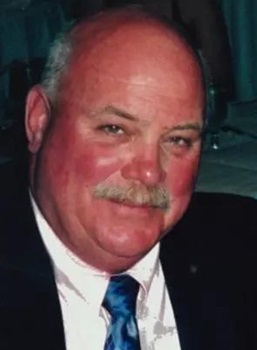 Michael Burden Clarkin, born in Corpus Christi, Texas on October 21, 1950, died on the Outer Banks of North Carolina on January 5, 2024, after a long illness. On the Outer Banks, Mike found his happy place and spent the rest of his life there. This is where “Captain Mike” was born. He spent years at the helm of multiple charter and commercial fishing boats, even gaining the honor of Captain of the Year in 1994. If you were to look through the annals of captains on the Outer Banks, you would find many who started under the guidance of Captain Mike. more, >>click to read<< 11:30
Michael Burden Clarkin, born in Corpus Christi, Texas on October 21, 1950, died on the Outer Banks of North Carolina on January 5, 2024, after a long illness. On the Outer Banks, Mike found his happy place and spent the rest of his life there. This is where “Captain Mike” was born. He spent years at the helm of multiple charter and commercial fishing boats, even gaining the honor of Captain of the Year in 1994. If you were to look through the annals of captains on the Outer Banks, you would find many who started under the guidance of Captain Mike. more, >>click to read<< 11:30
Massive bluefin tuna weighing more than 500 pounds reels in almost $800,000 at Tokyo auction
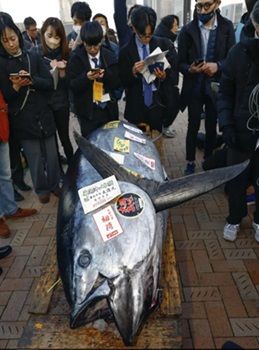 The most expensive piece of seafood at Tokyo’s largest fish market sold for a ton-a money at auction on the opening day of business. The mammoth bluefin tuna weighing nearly 525 pounds was purchased by seafood wholesaler Yamayuki and a sushi chain for nearly $800,000. Yamayuki and sushi chain Onodera group have purchased the market’s priciest fish of the new season for four years running. “If we were going to do it, we wanted to win,” Yamayuki president Yukitaka Yamaguchi told a throng of reporters that had assembled upon the auction’s conclusion. Video, photos, >>click to read<< 09:08
The most expensive piece of seafood at Tokyo’s largest fish market sold for a ton-a money at auction on the opening day of business. The mammoth bluefin tuna weighing nearly 525 pounds was purchased by seafood wholesaler Yamayuki and a sushi chain for nearly $800,000. Yamayuki and sushi chain Onodera group have purchased the market’s priciest fish of the new season for four years running. “If we were going to do it, we wanted to win,” Yamayuki president Yukitaka Yamaguchi told a throng of reporters that had assembled upon the auction’s conclusion. Video, photos, >>click to read<< 09:08
Crew members found safe on stranded fishing vessel located in St Francis Bay
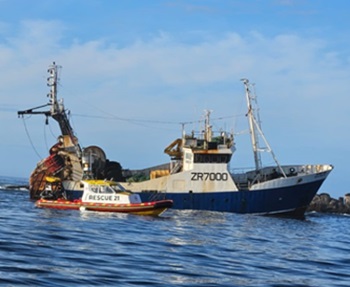 With help from various role players, the National Sea Rescue Institute in Kouga were able to rescue 24 crew members of a fishing vessel which ran aground at Shark Point in St Francis Bay on January 6. Sarah Smith, NSRI St Francis Bay station commander said that at 22:36 on January 6, NSRI St Francis Bay duty crew were activated following a call to NSRI Emergency Operations Centre (EOC) from (MRCC) Maritime Rescue Coordination Centre reporting a local 29-meter stern trawler fishing vessel, with 24 crew onboard, running aground at Shark Point, St Francis Bay. more, >>click to read<< 08:06
With help from various role players, the National Sea Rescue Institute in Kouga were able to rescue 24 crew members of a fishing vessel which ran aground at Shark Point in St Francis Bay on January 6. Sarah Smith, NSRI St Francis Bay station commander said that at 22:36 on January 6, NSRI St Francis Bay duty crew were activated following a call to NSRI Emergency Operations Centre (EOC) from (MRCC) Maritime Rescue Coordination Centre reporting a local 29-meter stern trawler fishing vessel, with 24 crew onboard, running aground at Shark Point, St Francis Bay. more, >>click to read<< 08:06
Project launched to support fishermen in Pembrokeshire
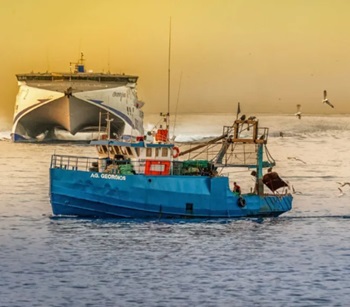 The Fishermen’s Mission is concerned about the ever-increasing need for support and assistance in coastal areas by struggling fishermen and are trying to bridge the gap to ensure that everyone is able to access the support they may need, when they need it. As a result of this, they are launching a pilot outreach project in Pembrokeshire to highlight the support that is on offer to those with a background in fishing. They are able to provide some help with finances and arrange access to support with issued including mental health, benefits and support for bereavements and relationships. more, >>click to read<< 07:14
The Fishermen’s Mission is concerned about the ever-increasing need for support and assistance in coastal areas by struggling fishermen and are trying to bridge the gap to ensure that everyone is able to access the support they may need, when they need it. As a result of this, they are launching a pilot outreach project in Pembrokeshire to highlight the support that is on offer to those with a background in fishing. They are able to provide some help with finances and arrange access to support with issued including mental health, benefits and support for bereavements and relationships. more, >>click to read<< 07:14
‘When the Island Had Fish’ is a portrait of Vinalhaven through its most prominent industry
 Vinalhaven Island sits like a plug between the Gulf of Maine’s offshore gyre and the estuaries, marshes and shallows of upper Penobscot Bay. After the melting of the continental ice sheet 13,000 years ago, these waters became some of the richest fishing grounds on earth. “When the Island Had Fish” tells the story of fish and fishing around Vinalhaven, focusing on the industry’s impact on the people of this singular place. It’s presented as history, garnished with some science and statistics, but at heart, this is an ethnography of a Maine fishing community. Janna Malamud Smith is the participant-observer, and her friends and acquaintances on Vinalhaven, where she summered for 30 years, are her informants. more, >>click to read<< 14:10
Vinalhaven Island sits like a plug between the Gulf of Maine’s offshore gyre and the estuaries, marshes and shallows of upper Penobscot Bay. After the melting of the continental ice sheet 13,000 years ago, these waters became some of the richest fishing grounds on earth. “When the Island Had Fish” tells the story of fish and fishing around Vinalhaven, focusing on the industry’s impact on the people of this singular place. It’s presented as history, garnished with some science and statistics, but at heart, this is an ethnography of a Maine fishing community. Janna Malamud Smith is the participant-observer, and her friends and acquaintances on Vinalhaven, where she summered for 30 years, are her informants. more, >>click to read<< 14:10
What is Captain Sig Hansen’s Net Worth and Salary?
 Sigurd Jonny Hansen entered the world on April 28, 1966, in Seattle, hailing from a proud lineage of Norwegian fishermen. At the tender age of 14, Sigurd embarked on his maritime journey, joining his father’s fishing vessel. His immersion in the world of fishing deepened, and upon completing high school, he transitioned into a full-time fisherman. It was during these formative years that Sig Hansen honed his expertise in navigating the challenging waters of Alaska and the Bering Sea. Over time, Sig Hansen progressively climbed the ranks aboard the Northwestern, ultimately assuming the role of relief skipper. At the age of 24, he ascended to the position of full-time captain of the vessel. Under his leadership, the Northwestern has maintained an exemplary track record, excelling in both safety and gross production. Notably, in 2005 and 2006, the Northwestern outperformed all other vessels featured on Deadliest Catch in terms of earnings. more, >>click to read<< 11:21
Sigurd Jonny Hansen entered the world on April 28, 1966, in Seattle, hailing from a proud lineage of Norwegian fishermen. At the tender age of 14, Sigurd embarked on his maritime journey, joining his father’s fishing vessel. His immersion in the world of fishing deepened, and upon completing high school, he transitioned into a full-time fisherman. It was during these formative years that Sig Hansen honed his expertise in navigating the challenging waters of Alaska and the Bering Sea. Over time, Sig Hansen progressively climbed the ranks aboard the Northwestern, ultimately assuming the role of relief skipper. At the age of 24, he ascended to the position of full-time captain of the vessel. Under his leadership, the Northwestern has maintained an exemplary track record, excelling in both safety and gross production. Notably, in 2005 and 2006, the Northwestern outperformed all other vessels featured on Deadliest Catch in terms of earnings. more, >>click to read<< 11:21
9 North Atlantic right whale calves born so far this breeding season
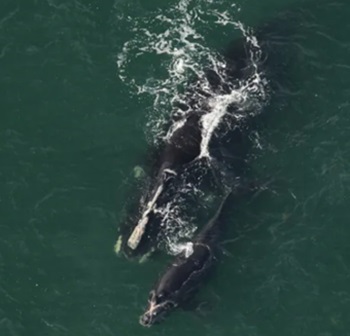 One month into the breeding season for North Atlantic right whales, nine calves have been born. Amy Warren, an assistant researcher at the New England Aquarium’s Anderson Cabot Center for Ocean Life, said she’s crossing her fingers for more births, but that the count at this stage is pretty much on par with previous seasons. “It’s been hard to judge because the trends have shifted a little bit earlier some years, a little bit later some years,” Warren said. “Last year at this time, I believe we had 10 calves. So we’re really not far off from that.” Photos, more, >>click to read<< 09:29
One month into the breeding season for North Atlantic right whales, nine calves have been born. Amy Warren, an assistant researcher at the New England Aquarium’s Anderson Cabot Center for Ocean Life, said she’s crossing her fingers for more births, but that the count at this stage is pretty much on par with previous seasons. “It’s been hard to judge because the trends have shifted a little bit earlier some years, a little bit later some years,” Warren said. “Last year at this time, I believe we had 10 calves. So we’re really not far off from that.” Photos, more, >>click to read<< 09:29
NSRI rescues grounded fishing vessel, saves 24 crew members
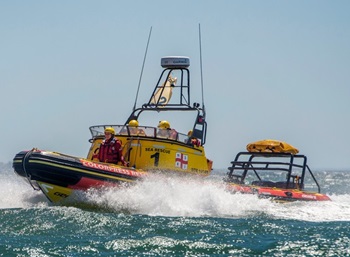 Members of the National Sea Rescue Institute (NSRI) rescued 24 crew members from a grounded 29 metre fishing vessel at St Francis Bay in Eastern Cape on Saturday. Sarah Smith, NSRI St Francis Bay station commander, said: “At 10.36pm, Saturday, January 6, NSRI St Francis Bay duty crew were activated following a call to NSRI EOC (Emergency Operations Centre) from MRCC (Maritime Rescue Coordination Centre) reporting a local 29 metre stern trawler fishing vessel, with 24 crew onboard, running aground at Shark Point, St Francis Bay. more, >>click to read<< 07:30
Members of the National Sea Rescue Institute (NSRI) rescued 24 crew members from a grounded 29 metre fishing vessel at St Francis Bay in Eastern Cape on Saturday. Sarah Smith, NSRI St Francis Bay station commander, said: “At 10.36pm, Saturday, January 6, NSRI St Francis Bay duty crew were activated following a call to NSRI EOC (Emergency Operations Centre) from MRCC (Maritime Rescue Coordination Centre) reporting a local 29 metre stern trawler fishing vessel, with 24 crew onboard, running aground at Shark Point, St Francis Bay. more, >>click to read<< 07:30
Area north of Cape Falcon opens Feb.1 to commercial Dungeness crab fishing
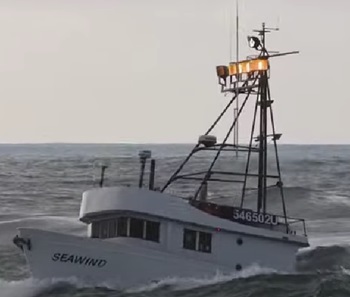 Commercial Dungeness crab fishing from Cape Falcon to Klipsan Beach, Washington begins Feb. 1. A fourth round of pre-season testing shows male crabs in this area were not quite ready for a January opening. The additional time will allow crab to continue to fill with meat before harvest. Targeted to open Dec. 1, Oregon’s ocean commercial Dungeness crab season can be delayed or partially opened so consumers get a high-quality product and crabs are not wasted. This year’s season was partially opened (Cape Foulweather to the California border) Dec. 16 after a delay due to low meat yield in areas north of Cape Foulweather. Once meat yield met criteria, commercial crabbing began Dec. 31 from Cape Foulweather to Cape Falcon. Video, more, >>click to read<< 13:22
Commercial Dungeness crab fishing from Cape Falcon to Klipsan Beach, Washington begins Feb. 1. A fourth round of pre-season testing shows male crabs in this area were not quite ready for a January opening. The additional time will allow crab to continue to fill with meat before harvest. Targeted to open Dec. 1, Oregon’s ocean commercial Dungeness crab season can be delayed or partially opened so consumers get a high-quality product and crabs are not wasted. This year’s season was partially opened (Cape Foulweather to the California border) Dec. 16 after a delay due to low meat yield in areas north of Cape Foulweather. Once meat yield met criteria, commercial crabbing began Dec. 31 from Cape Foulweather to Cape Falcon. Video, more, >>click to read<< 13:22
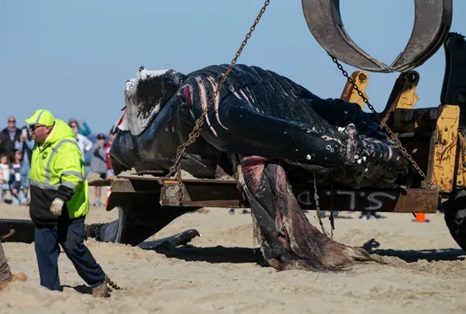
Whales and other marine life are still dying. The crisis at the NJ Shore remains urgent
It’s worth noting that it has been a full year since coastal residents realized that there was something amiss in our oceans — the start of a frightening number of whale and dolphin deaths. In the New Jersey and New York area alone, there have been 38 whales and 60 dolphins and porpoises washed ashore. That’s 98 endangered marine mammals found dead. That’s almost two marine mammals per week, while others have sunk to the bottom of the ocean. Meanwhile, the federal agencies responsible to protect marine mammals have neglected their responsibility, and turned down opportunities to cooperate, be transparent and engage in meaningful dialogue. Video, more, >>click to read<< 11:48
Humboldt crabbers on strike
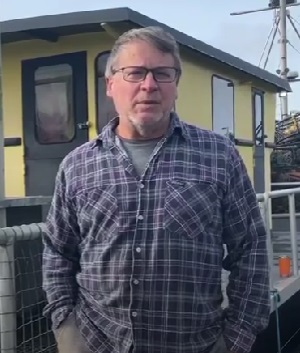 Kevin Pinto, a local fisherman who owns Jenna Lee’s Seafood on Woodley Island in Eureka, Calif., says the companies that purchase crab from the North Coast decided to pay a price that is lower than the fishermen would like. “They offered us a lower price down here—with stipulations it could go lower—and we decided that it probably wasn’t a good idea to fish for that,” Pinto said. The Pacific Seafood Company is one of Humboldt County’s fishermen’s buyers. Fishermen like Pinto are currently withholding their catch, hoping the companies who purchase from them will raise their price per pound of crab. Video, >>click to read<< 08:48
Kevin Pinto, a local fisherman who owns Jenna Lee’s Seafood on Woodley Island in Eureka, Calif., says the companies that purchase crab from the North Coast decided to pay a price that is lower than the fishermen would like. “They offered us a lower price down here—with stipulations it could go lower—and we decided that it probably wasn’t a good idea to fish for that,” Pinto said. The Pacific Seafood Company is one of Humboldt County’s fishermen’s buyers. Fishermen like Pinto are currently withholding their catch, hoping the companies who purchase from them will raise their price per pound of crab. Video, >>click to read<< 08:48
Podcast: The Fishmonger Tommy Gomes Returns With Dry-Aged Fish
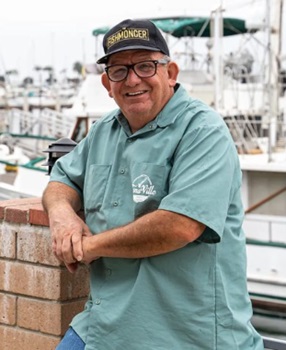 These days, Gomes runs TunaVille, a seafood shop at Driscoll’s Wharf in San Diego Harbor that serves local, only. It opened last May. The fish is caught by residents on city boats and is delivered 10 feet away to the storefront. “It never sees the back of a truck, our fish,” Gomes says in the episode. Tunaville is a partnership with another fisherman and local seafood icon, Mitch Conniff of Mitch’s Seafood, and a handful of other local fishing families who have bought in. Restaurants like Herb & Wood, Solare, and Juan Jasper, for example, are clients, sourcing their treats from the sea from Gomes. more, click to read/listen o7:43
These days, Gomes runs TunaVille, a seafood shop at Driscoll’s Wharf in San Diego Harbor that serves local, only. It opened last May. The fish is caught by residents on city boats and is delivered 10 feet away to the storefront. “It never sees the back of a truck, our fish,” Gomes says in the episode. Tunaville is a partnership with another fisherman and local seafood icon, Mitch Conniff of Mitch’s Seafood, and a handful of other local fishing families who have bought in. Restaurants like Herb & Wood, Solare, and Juan Jasper, for example, are clients, sourcing their treats from the sea from Gomes. more, click to read/listen o7:43
Almost 300 homes on Bere Island without power after sea trawler damages underwater ESB cable
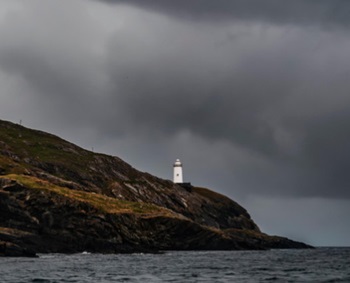 An Island of more than 200 people off west Cork has lost electricity after large fishing trawlers damaged an undersea ESB cable. Bere Island has been without power for its approximately 280 ESB customers since the incident yesterday afternoon. An undersea diver is attempting to locate the damaged cable so restoration work can be carried out. “The outage occurred yesterday afternoon (4 January) as a result of a fishing vessel accidentally coming into contact with a cable running from Castletownbere to Bere Island,” a spokesperson said. more, >>click to read<< 16:00
An Island of more than 200 people off west Cork has lost electricity after large fishing trawlers damaged an undersea ESB cable. Bere Island has been without power for its approximately 280 ESB customers since the incident yesterday afternoon. An undersea diver is attempting to locate the damaged cable so restoration work can be carried out. “The outage occurred yesterday afternoon (4 January) as a result of a fishing vessel accidentally coming into contact with a cable running from Castletownbere to Bere Island,” a spokesperson said. more, >>click to read<< 16:00
Flawed snow crab price-setting system needs overhaul soon, FFAW says
 The president of the Fish, Food & Allied Workers union says time is ticking on getting a new formula-based seafood pricing system in place ahead of the 2024 season. A November report from the province’s three-person fish price-setting team submitted to the provincial government said the current seafood price-setting process is flawed and changes need to be made to avoid another tie-up that halted the snow crab industry for six weeks last season. The report offered nine recommendations, including that a formula-based pricing system be implemented by the end of January. FFAW president Greg Pretty said that process is underway. more, >>click to read<< 14:16
The president of the Fish, Food & Allied Workers union says time is ticking on getting a new formula-based seafood pricing system in place ahead of the 2024 season. A November report from the province’s three-person fish price-setting team submitted to the provincial government said the current seafood price-setting process is flawed and changes need to be made to avoid another tie-up that halted the snow crab industry for six weeks last season. The report offered nine recommendations, including that a formula-based pricing system be implemented by the end of January. FFAW president Greg Pretty said that process is underway. more, >>click to read<< 14:16
Lobstermen Sue State Agency for Mandating Installation of 24-Hour Electronic Location Monitoring System on Their Boats
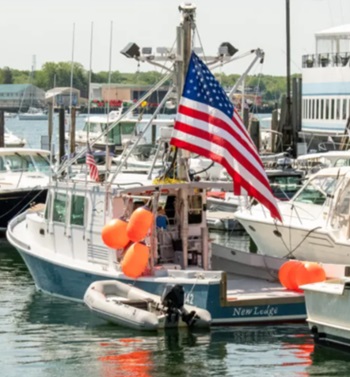 A group of five Maine lobstermen are suing Maine Department of Marine Fisheries (MDMR) Commissioner Patrick Keliher over new rules mandating that all federally permitted lobster boats be equipped with a 24-hour electronic location monitoring system. These mandated devices — provided by the MDMR — identify a vessel’s location every sixty seconds while in motion and once every six hours when stationary. Using one of these devices, a boat’s position is able to be accurately determined within 100 meters, or 328.1 feet. According to the lobstermen, this new requirement violates the Fourth and Fourteenth Amendments, as they allege that it jeopardizes their Constitutionally protected rights to privacy and due process. more, >>click to read<< 11:20
A group of five Maine lobstermen are suing Maine Department of Marine Fisheries (MDMR) Commissioner Patrick Keliher over new rules mandating that all federally permitted lobster boats be equipped with a 24-hour electronic location monitoring system. These mandated devices — provided by the MDMR — identify a vessel’s location every sixty seconds while in motion and once every six hours when stationary. Using one of these devices, a boat’s position is able to be accurately determined within 100 meters, or 328.1 feet. According to the lobstermen, this new requirement violates the Fourth and Fourteenth Amendments, as they allege that it jeopardizes their Constitutionally protected rights to privacy and due process. more, >>click to read<< 11:20
“Offshore wind is in trouble,,, US offshore wind slammed by runaway costs
 The US offshore wind industry, banking on a big boost from the landmark Inflation Reduction Act, has found itself face-to-face with a major hurdle that’s been right there in the name all along: inflation. In fact, the law might even be making it worse. More than 10 gigawatts of offshore wind projects along the US East Coast, the equivalent of roughly 10 nuclear power reactors, are at serious risk as higher costs force developers to re-crunch the numbers for proposals originally modeled years ago, before a runup in interest rates and material costs. Orsted A/S, the Danish wind giant, said this week it’s prepared to walk away from projects unless it gets even more government aid. Other developers are already paying tens of millions in penalties to exit contracts they say no longer make financial sense. more, >>click to read<< 08:20
The US offshore wind industry, banking on a big boost from the landmark Inflation Reduction Act, has found itself face-to-face with a major hurdle that’s been right there in the name all along: inflation. In fact, the law might even be making it worse. More than 10 gigawatts of offshore wind projects along the US East Coast, the equivalent of roughly 10 nuclear power reactors, are at serious risk as higher costs force developers to re-crunch the numbers for proposals originally modeled years ago, before a runup in interest rates and material costs. Orsted A/S, the Danish wind giant, said this week it’s prepared to walk away from projects unless it gets even more government aid. Other developers are already paying tens of millions in penalties to exit contracts they say no longer make financial sense. more, >>click to read<< 08:20
The Supreme Court can save working fishermen from Biden regulators
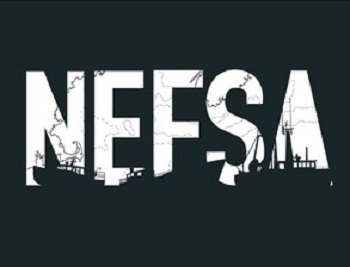 The crew and I had been trawling the Gulf of Maine for several days aboard the F/V Teresa Maria IV, the commercial fishing vessel I captained for 14 years. I had only just settled into my bunk for a few hours of sleep. That’s when the rogue wave hit. Life at sea is never predictable. A promising forecast could give way at any time to a squall with heavy swells. Essential navigation components might break. On that night, circumstances coalesced such that a rogue wave knocked my boat clean over. We were capsized in the black of night. This unsettling experience was front of mind when my organization, the New England Fishermen’s Stewardship Association (NEFSA) filed an amicus brief in an upcoming Supreme Court case about the Biden administration’s power over the fishing industry. photos, more, >>click to read<< 06:46
The crew and I had been trawling the Gulf of Maine for several days aboard the F/V Teresa Maria IV, the commercial fishing vessel I captained for 14 years. I had only just settled into my bunk for a few hours of sleep. That’s when the rogue wave hit. Life at sea is never predictable. A promising forecast could give way at any time to a squall with heavy swells. Essential navigation components might break. On that night, circumstances coalesced such that a rogue wave knocked my boat clean over. We were capsized in the black of night. This unsettling experience was front of mind when my organization, the New England Fishermen’s Stewardship Association (NEFSA) filed an amicus brief in an upcoming Supreme Court case about the Biden administration’s power over the fishing industry. photos, more, >>click to read<< 06:46







